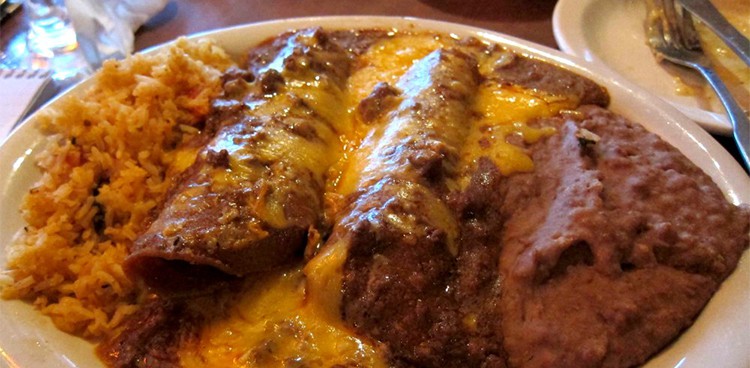
There is a great standing debate over the difference between Tex-Mex and authentic Mexican cuisine. While some argue that the differences are few and the similarities great, Tex-Mex should be given some credit and recognized as its own cuisine. Tex-Mex grew out of the Tejano culture in Texas and developed its own style and flair. One dish in particular exemplifies Tex-Mex: enchiladas made with Velveeta or American cheese. Forgoing traditional Mexican cheeses like queso fresco, Tex-Mex enchiladas warmly embrace processed cheeses.
Why is this? According to Robb Walsh, author of The Tex-Mex Cookbook and reigning authority on all things Tex-Mex, it likely dates back to the Great Depression and the availability and convenience of processed cheese. The government invested in surplus goods that had a longer shelf life and could be easily transported. This meant providing blocks of processed cheese that would last a good long time.
Local grocery stores didn’t carry specialty Mexican cheeses until more recently, which meant families used what they had on hand, and what they had on hand was Velveeta. The widespread use of processed cheese moved beyond single-family kitchens, as The Kansas City Star explains:\
Government cheese’s keeping qualities, mild flavor, and resistance to curdling when melted also made it appealing to school lunch programs, food banks, and home cooks. Tex-Mex restaurants also took note of Americans’ growing fondness for the cheese and began to use it.
Cheese isn’t the only thing Tex-Mex enchiladas offer that traditional Mexican dishes don’t. There’s also cumin. Robb Walsh ties the use of cumin in Tex-Mex to immigrants from the Canary Islands settling in San Antonio in the 1700s. The development of Tex-Mex really shows how cultures meet and change food, and how food can adapt when it needs to be cheap and accessible.
The iconic Tex-Mex enchilada is stuffed with cheese, topped with a red chili sauce, and then covered in more cheese. If you don’t want to use Velveeta, cheddar is an excellent substitute. Try Robb Walsh’s take on the dish or this offering from Sylvia Cásares, owner of Sylvia’s Enchilada Kitchen in Houston.
Feature Photo Credit: Mai Pham, Houston Press



